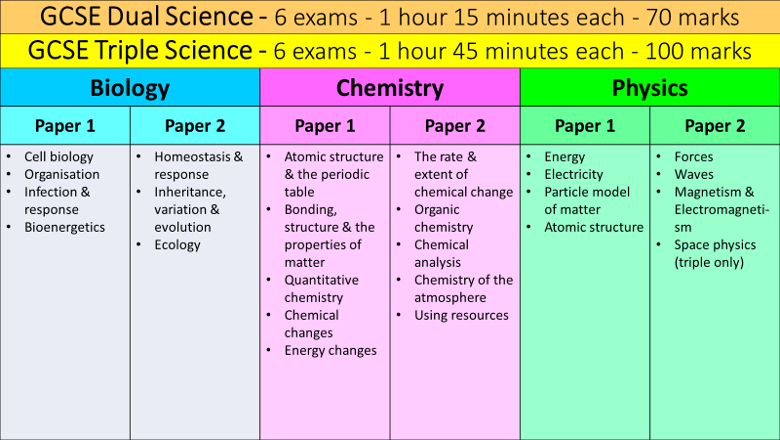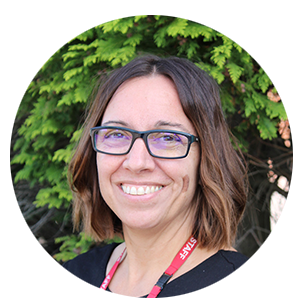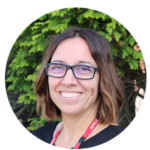- Home
- About us
- Curriculum
- Personal Development
- Parents
- Policies
- Jobs
- Contact
- Office 365
- DONATE

Biology paper 1: 10th May 2024 (am)
Chemistry paper 1: 17th May 2024 (am)
Physics paper 1: 22nd May 2024 (am)
Biology paper 2: 7th June 2024 (pm)
Chemistry paper 2: 11th June 2024 (am)
Physics paper 2: 14th June 2024 (pm)
Highly effective: | Less effective (use along with the more effective techniques) |
1. Spaced practice – this is where revision is spread over a longer period, so revision starts as early as possible. This is because revision becomes more effective when it is built on prior knowledge and understanding of a topic becomes deeper with repetition. | Highlighting and underlining: are you highlighting everything or key ideas? Are you highlighting the right things? Does that mean what isn’t highlighted is unimportant? How will you ensure this is memorised? |
2. Interleaving – revision should be done in small chunks, switching between topics and subjects each time. It has been shown to be better to leave a subject, study something else and revisit it again at a later date, than repeating revision straight away. | Summarising: useful if you are competent at picking out key points from text. |
3. Retrieval practice: Practicing questions and self-testing is crucial, not only to see how you are doing, but to develop understanding (as long as there is access to the answers, and you can review where they have gone wrong). This can even be as simple as the revision technique look-cover-recall-check-improve. | Re-reading notes: are you just reading or are you actively testing yourself on your understanding to improve later recall? |
4. Elaboration: Why questions: are you asking yourselves questions as to how things work and why they work as you cover content. Making links between other topics, examples and your own experiences. | Re-writing notes: similar to re-reading and highlighting? What are you doing with the information to ensure it stays with you? Do you understand what you are writing? |
5. Concrete examples – Refer to as many examples of a topic you are studying as possible. Vary the type of material you are using (text, video, modelled answers, audio) as well as different applications or contexts of the topic you are studying. | Going over the same notes again and again: try finding alternative viewpoints and examples to develop a deeper understanding of that topic. |
6. Dual Coding: When you use visuals as well as words/audio. This doubles your working memory capacity (your mental ‘desk-space’) rather than just words. | Things that you may think help you to concentrate, like music and TV to drown out background noise, use up working memory so you are able to process less. Classical music has been shown to help, however! |
Combined trilogy- https://www.bbc.co.uk/bitesize/examspecs/z8r997h
Triple Biology- https://www.bbc.co.uk/bitesize/examspecs/zpgcbk7
Triple Chemistry- https://www.bbc.co.uk/bitesize/examspecs/z8xtmnb
Triple Physics- https://www.bbc.co.uk/bitesize/examspecs/zsc9rdm
This free website has topic based multiple choice questions that are self-marking. This will help students to check their knowledge for each topic and is suitable for all students. This is great to use before attempting exam questions.
This free website has signposted revision maps and lots of exam questions to help students to prepare for the examinations. Exam board for Science is AQA. This is most suitable for students studying the Triple Science pathway.
https://alsager.sharepoint.com/Sites/Learning/KS4%20Revision/Forms/AllItems.aspx
Trilogy Science- https://www.aqa.org.uk/subjects/science/gcse/combined-science-trilogy-8464/assessment-resources
Triple Biology- https://www.aqa.org.uk/subjects/science/gcse/biology-8461/assessment-resources
Triple Chemistry- https://www.aqa.org.uk/subjects/science/gcse/chemistry-8462/assessment-resources
Triple Physics- https://www.aqa.org.uk/subjects/science/gcse/physics-8463/assessment-resources




Alsager School is one of the highest performing schools in Cheshire East. Take a look at our prospectus to find out more.
Alsager School, Hassall Road, ST7 2HR
© 2025 All Rights Reserved